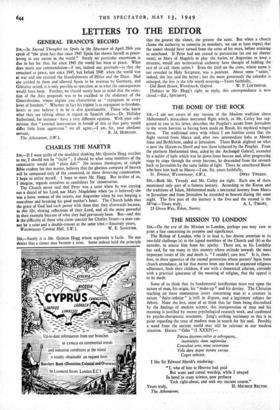THE MISSION TO LONDON
Stn,—On the eve of the Mission to London, perhaps you may care to print a line concerning its purpose and significance.
The Bishop of London, who is to lead it, has drawn attention to its two-fold challenge (a) to the lapsed members of the Church and (b) to the outsider, to arouse him from his apathy. There are, as his Lordship has said, far too many in this country whose attitude towards the most important issues of life and death is, " I couldn't care less." It is, there- fore, to these agnostics of the second generation whose parents' lapse from church attendance, or for that matter from any form of organised religious adherence, finds their children, if not with a theoretical atheism, certainly with a practical ignorance of the meaning of religion, that the appeal is to be made. Some of us think that its fundamental justification must rest upon the nature of man, his origin, his "make-up" " and his destiny. The Christian teaching on these momentous issues concerning man as a creature in nature "finite-infinite" is still in dispute, and a legitimate subject for debate. None the less, some of us think that far from being discredited by the findings of modern science, this interpretation of man and his meaning is justified by recent psychological research work, and confirmed by psycho-therapeutic treatment. Jung's striking testimony to this is in point regarding the state of modern man in search for his soul. Possibly - a word from the ancient world may still be relevant to our modern situation. Horace. "Odes "(I. XXXIV)—
Parma deorum cult or et infrequens,
insanientis dum sapientiae Consultuserro,.nunc retrorsum Vela dare atque iterare cursus
Cogor relictos. I like Sir Edward Marsh's rendering:
"I, who of late to Heaven had paid But scant and casual worship, while I strayed bond nd to crazy science, now perforce
Tack right-about, and seek my ancientcourse."






































 Previous page
Previous page